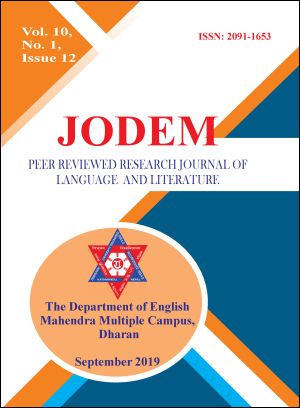Exploration of Masculinity in Sanjeev Upreti's Hansa
DOI:
https://doi.org/10.3126/jodem.v11i1.34805Keywords:
Gender roles, hegemonic masculinity, identity, masculinity, patriarchyAbstract
Can a man be rigid, strong and decisive all the time? How do people know about their normative gender roles? Who formulates the rules about love, sex, marriage, and men and women relations? These are some of the issues raised in Sanjeev Upreti's latest novel Hansa [Duck] (2019). The novel artistically and sensitively traces the limits of patriarchal gender roles and suggests that masculinity is contextual and undergoes a continuous process of change. The major male characters of the novel, despite their inclination towards heterosexuality, and despite their effort to perform traditional masculinity, fail. Though they have embraced hegemonic masculinity as an ideal form of masculinity, and try to practice it, they are weak and vulnerable. This article explores why these characters fail to perform their gender roles as par their expectations. To analyze male gender roles and masculinity in the novel, theories of masculinity are drawn basically from Raewyn Connell and Judith Butler‟s social constructivist approach to gender studies. Analyzing the novel through the lens of masculinity helps the reader understand the constraints of hegemonic masculinity and provides insight to alternative ways of understanding male gender roles and masculinity. The article has found that the male characters of the novel suffer because they stick to the traditional masculinity and fail to adapt to their changed roles.
Downloads
Downloads
Published
How to Cite
Issue
Section
License
© Department of English, Mahendra Multiple Campus, Dharan, Nepal

